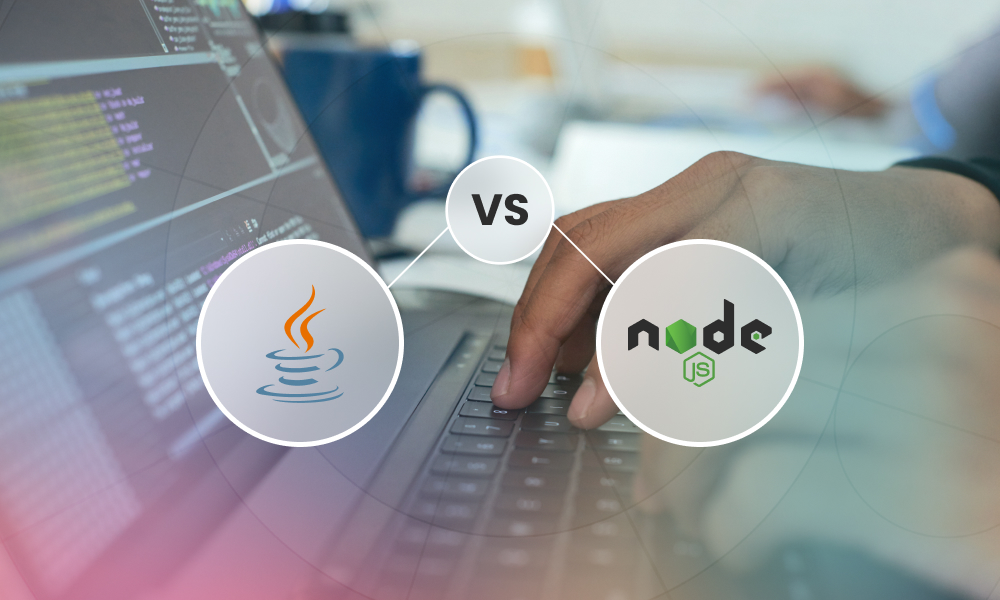Comparing Java Vs. Node js: Benefits, Use Cases & Differentiation

Table of Contents
Java is an enterprise benchmark and one of the most globally popular programming languages. Node JS is an explicit framework that spins around JavaScript and can accomplish parallelism resourcefully. Both can be used for your use cases relying on your project requirements.
In this blog, we will discuss the benefits of Java and Node js technologies, their various use cases, and comparatively, study them. We will also clarify which technology, Nodejs or Java, is precise for your next development project.
Mostly, people get confused while comparing Java vs. Node js. When it comes to an application development language, it becomes necessary to do your research beforehand. Otherwise, it could waste time, effort, and efficiency.
Java is counted among the best application development solutions. You can use this object-oriented language to create attractive mobile and desktop applications. The Android world is already dominated by Java and embedded worlds such as Blu-ray disks.
On the other hand, Node js can be used to write JavaScript on both the server and client sides. It is confusing to choose between these two prominent technologies. Hence it becomes imperative to compare Nodes js vs. Java performance.
Significant Benefits of Java Technology
Java was developed to be simple to use and is consequently straightforward to write, compile, debug, and understand compared to other development languages. Explore the prominent advantages of Java. These also include advantages of node js over Java –
1) Enhanced Interoperability
In the current scenario, integration with 3rd party business applications needs to be undertaken quickly. We all know how variable and dynamic is the business marketplace these days.
Moreover, Java technology provides a very efficient way to tackle this scenario through seamless interoperability. Hence the Java language helps your business and operations turn interoperable for separate web and desktop apps.
2) High-security Levels
Java is considered one of the most secure and safe development languages. Java offers APIs to safeguard network communication with precise encryption, explicit message integrity, along with client and server authentication.
Java platform further facilitates cryptography, public key infrastructure, secure collaboration, and complete access control.
3) Cost-efficient Development
One vital thing that is comprehended for Java technology is that it offers cost savings. An enterprise can handle its capital efficiently by trimming down the cost of development while using Java as compared to other advanced technologies.
So, you can enable your development projects in Java technology with the best quality and affordable end product.
4) Good Readability
Readable code saves forthcoming programmers’ effort and time investment. Good code readability is essential for big-sized software development projects with numerous programmers, and where the source code that is being written will have to be altered by other professionals.
Java makes it straightforward for developers to maintain technology projects, whether reading, writing, or debugging is involved.
5) Simple to Sustain
Today it is significant for enterprises to support, maintain and sustain project applications for enhanced business and operational outcomes. Java application projects are both better maintainable and sustainable. Maintenance is quite cost-effective in Java as compared to today’s advanced technologies.
Significant Benefits of Node JS Technology
Node js shines in developing swift, scalable project applications, providing benefits in productivity and performance levels. Here are the vital advantages of node js.
1) Non-blocking I/O System
There could arise times when numerous requests have been received at one time. At those times, Node js proves to be an extremely reliable companion. No matter how many requests are, all requests can be processed simultaneously by Node js. This scenario results in a seamless performance and high scalability.
2) Full-Stack Freedom
This benefit is again an important factor. The developers can write both in the frontend and backend in JavaScript inside Node js. Hence, it is made ensured by Nodejs that the applications have been deployed smoothly and the learning curve is reduced.
3) Dynamic Community
There is a vast as well as dynamic community available when you are using Node js. Numerous codes and solutions are already there that the developers can use. This scenario reduces your development team’s efforts and streamlines the involved processes by a significant amount. Also, for the developers with less experience, it is like a heavenly place where they can be at ease.
4) Caching ability
The single modules that are there in the memory of the application get cached by Node js. Hence, it removes the requirement for executing the code repeatedly to obtain quicker response times.
5) Strong Support
Node js provides the users with such robust support that even a user without experience can learn it by himself on Node js. The purposes like examination and identification of project dependencies are taught to the developers in the simplest way possible through Node JS tutorials.
Specific Use Cases of Java
Java has become the most influential programming language on account of its significant use cases. Java use cases include diverse certifiable applications that are lively and provide acquisitive benefits.
- Web Application Development
- Game development
- Scientific applications
- Software tools
- Desktop GUI
- Test automation
- Android app development
- Applications for enterprises
- Big data technologies
- Banking as well as FinTech apps
- Wen servers/ app servers
- Business applications
- Embedded systems
Specific Use Cases of Nodejs
Node JS works best for merely a specific type and sort of web application. Here are diverse node js use cases to comprehend and when it is worth exploring for web app development projects.
- Complex single-page applications
- Streaming web apps
- Backends and servers
- Real-time software as well as streaming applications. These include collaboration tools for editing documents, audio/video conferencing, chat apps, and many more.
- Building APIs
- Scripting and automating
- Microservices
- Applications based on IoT
Java and Nodejs Comparison
Now that we have gone through the different use cases and benefits of both the languages, let us also explore the direct difference between Java and node js along with node js vs. java performance levels –

1) Creation
- Java is a C++-driven language that is object-oriented as well as class-based.
- On the other hand, Nodejs uses frameworks like C, JavaScript, and C++ for writing the codes.
2) Suitable Projects
- Complex and concurrent projects based on the web are apt to be performed in Java.
- And for Nodejs, projects of small size are the best suitable to be performed.
3) Application
- Java supports web-based, complex, and highly concurrent apps.
- When we look at Nodejs, an app that is quick and scalable from the server-side is the most suitable.
4) Scope
- Java dominates server-side interaction. Thus, in Node js vs. Java backend, Java is more specialized.
- Both client-side, as well as server-side utilizations are available in Nodejs.
5) Usage
- Extremely concurrent apps and messaging web apps are the prime usage examples for Java.
- Nodejs is most useful when you need a quicker and scalable web application.
6) Frameworks
- Significant Java frameworks include Tapestry, Spring, and Struts.
- Best Nodejs frameworks include Sails.js, Express.js, and Partial.js.
7) Installation
- A Java Development Kit (JDK) is needed for running Java.
- An archived file needs to be installed for running Node.js.
Key Takeaways
We hope this blog post helped you with a precise nodes js vs. java comparison. Both the languages have their own benefits and drawbacks. You need to consider Java vs. Node js benchmark to decide your best option. It would help if you compared them on Node js vs. Java speed, Java vs. Node js backend, and many other bases to reach a fitting conclusion.
We at IndiaNIC are a leading software provider company and can assist you in both Java and Node js development for your upcoming projects.
Frequently Asked Questions on Node js vs. Java
When should Java be used?
- Scientific apps and software
- Web apps
- Trading apps
- Big data projects
- Social media
- E-commerce and financial services
When should Nodejs be used?
- Streaming
- Real-time apps production
- Online stores
- Android applications
- Big data projects
How are Java apps easy to use?
There are multiple test cases available in Java. So grouping, sequencing, and data-driven features can be smartly used. Parallel testing can be done as well. Various easy-to-use frameworks for Java include Junit, Apache, FitNess, JMeter, and Selenium.
How does the scalability of Java matter?
Java enables multiple vertical and horizontal scaling of projects, using a one-size-fits-all framework and introducing single-point management.
How does the scalability of Nodejs matter?
Nodejs is highly scalable. Several concurrent requests in Node JS can be handled by event-driven data models and non-blocking I/O. The event-loop architecture is also there to process maximum requests on the platform.



